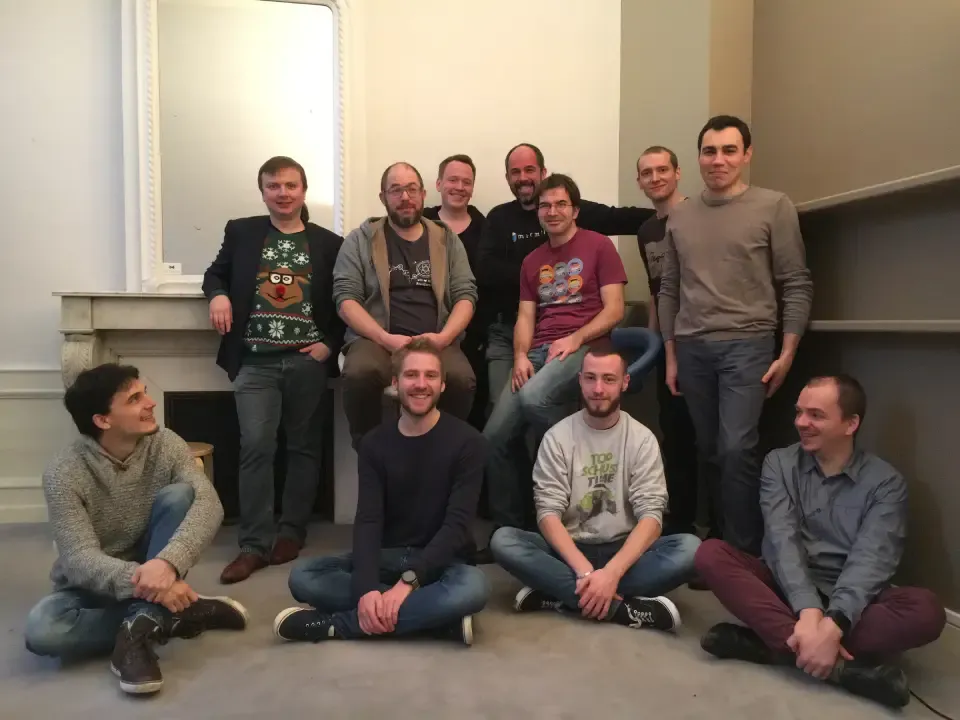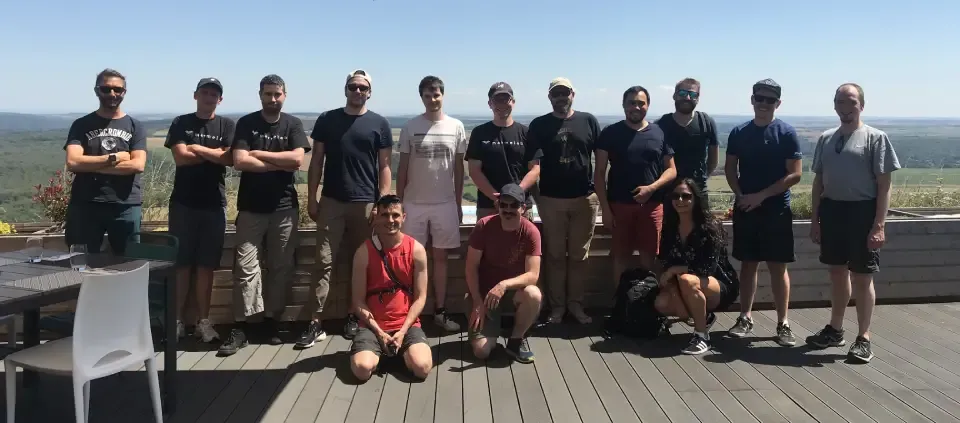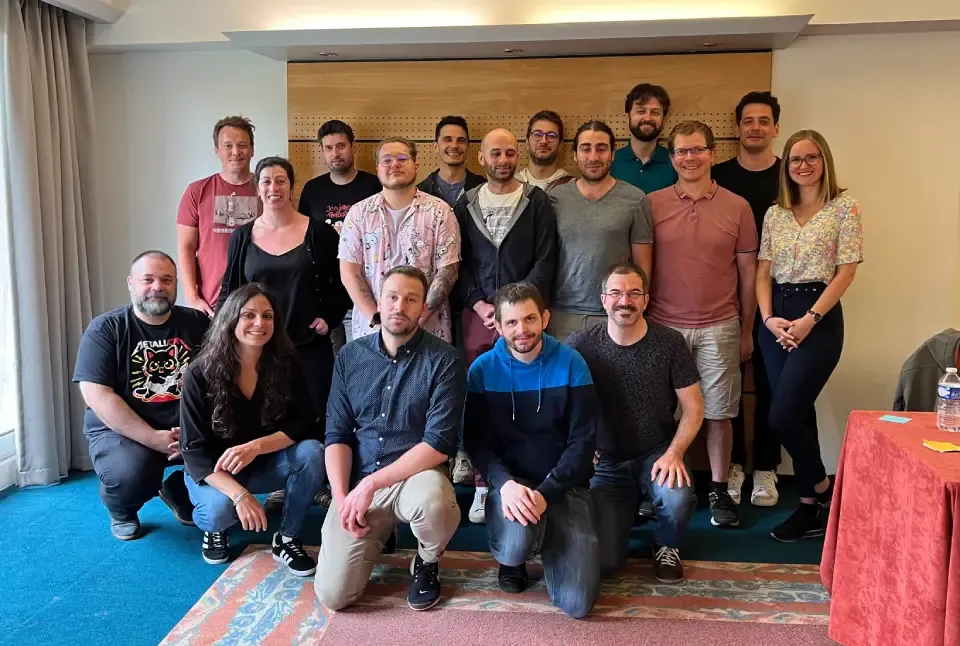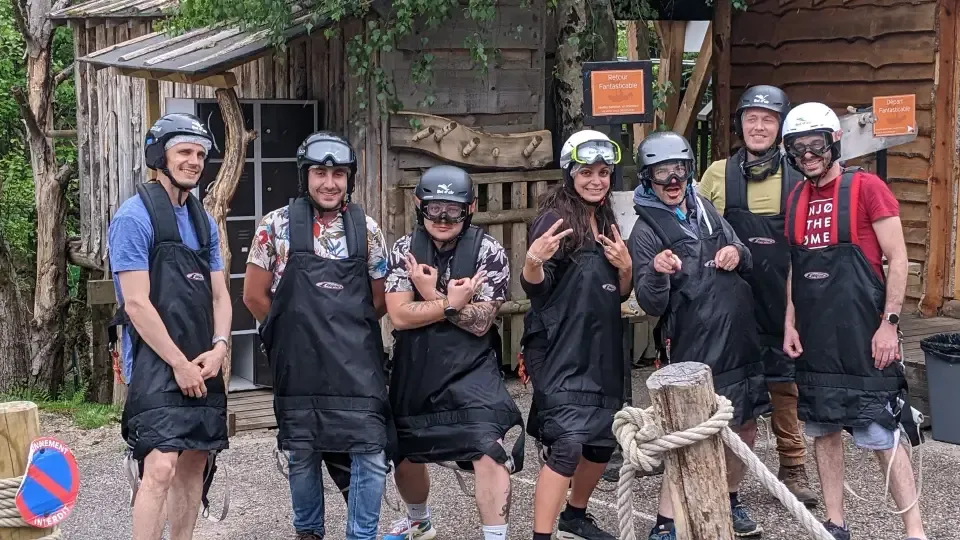
Marmelab Celebrates 10 Years Of Digital Innovation

Marmelab is celebrating its 10th anniversary this month. We’ve come a long way from our humble beginnings as a small team of three people, to now having a team of 18. We have had the opportunity to work with hundreds of clients and deliver over 100 digital products. None of this would have been possible without the support of a lot of people, so I would like to take this opportunity to acknowledge and thank them all.
A Decade Of Innovation
Ten years ago, the use of agile processes to build web and mobile apps was still a relatively new concept. Legal departments were hesitant to sign “agile contracts” as they couldn’t predict the final cost of a project. Many digital projects were unsuccessful because obtaining feedback from end users was not a priority.
Marmelab positioned itself as a “digital innovation workshop”, and this was an instant hit. Our customers discovered that having an autonomous team of full-stack developers and a facilitator meant that we could start quickly, iterate frequently, and bring them validated learning faster than with any other approach. Our development process, influenced by Lean Startup and Agile methodologies, proved to be an effective solution for projects with high levels of uncertainty. Not only did we deliver software quickly, but we also helped our clients validate their ideas and avoid costly mistakes.
We’ve worked on too many projects and with too many customers to name them here, but we’re grateful to have worked with companies such as Arte.tv, CNRS, Broadcom, Accor, Wallix, Le Monde, Amnesty International, The Fork, Sensio Labs, BlueMoon, Axa, Coutot-Roehrig, 1859 Cloud, and all the others. Without our clients, we wouldn’t be here today, so I want to thank them for their trust and their support.

A Decade of JS
Most customers were not particularly concerned with the technology we used - they were primarily focused on obtaining valuable data from usage. We chose to use JavaScript. This decision was a risk at the time, as Node.js was still a relatively new framework, and the “good practices” for JavaScript development were a moving target.
But it greatly simplified the recruitment process. Finding a good Java, PHP, or C# developer can be difficult, but most developers have at least some experience with JavaScript. As a result, the pool of potential candidates was larger. Additionally, using the same language for the backend and frontend allowed us to explore new software architectures that unlocked new user experiences.
It wasn’t without its challenges, of course. In the early 2010s, there was a running joke about “a new JavaScript framework every day”. We tried them all: jQuery, Backbone, Angular.js, Meteor, and React. When we look today at the code we wrote 10 years ago, it is painful to see. But it also serves as a reminder of how much we’ve learned and how much the JS ecosystem has matured since then.
Today, Marmelab is often cited as a React.js workshop, but we still care more about the product than about the program. And even though there is less innovation in JavaScript today, we keep on exploring new territories and technologies, such as Solid, Svelte, and Rust.

A Decade of Open-Source
Open source has been a personal passion of mine since 2006. At that time, I was working at a company called Sensio, and I was learning web development under the mentorship of a former classmate named Fabien Potencier. He made the decision to open-source an internal framework that he had been developing for several months. This was a bold move: why would he give away something that he had invested so much time and effort into?
The rest is history: Symfony, the PHP framework created by Fabien, became the most popular PHP framework in the world. As I participated in documenting and extending the framework, I witnessed the power of open source. I saw how a community of developers could come together to create something greater than any one person could have imagined.
I always wanted to make open-source a core part of Marmelab’s identity. Not only do we mostly use open-source projects, but we’ve also been contributing to many open-source projects, totaling around 70,000 stars on GitHub. This has paid off, as we’ve been able to attract and retain talented developers and gain new clients through the notoriety of our open-source contributions.
But what I am most proud of is creating a sustainable business model for an open-source project. We started react-admin 5 years ago, and its rapid popularity led to an increased cost of maintenance. We decided to ask customers to pay for additional services, and to my surprise, this worked incredibly well. We now have a dedicated team working full-time on react-admin. This is made possible by the contribution of more than 450 enterprise edition customers, and by the hard work of our Sales team.

A Decade of Challenges
Initially, the thought of having to pay a team of 3 people while only having orders for the next month and a half kept me up at night. Today, we are a team of 18, and we still operate with a relatively short-term horizon, but I’ve learned not to stress about it.
Marmelab has faced numerous challenges over the past 10 years, such as:
- A sudden increase in rent
- Customers refusing to pay for completed work
- Core technical assets becoming outdated overnight
- Failed spin-off initiatives
- A fall out with a co-founder
- A global pandemic that forced us to work remotely
- And lately, the highest inflation in nearly 40 years.
Each time we faced a new challenge and found a solution, we gained trust and became more resilient. We don’t always have the solution in advance, but we trust that we will find one.
I want to underline that overcoming these challenges is not only teamwork, it also requires the support of friends and families. I, for one, couldn’t lead Marmelab for 10 years without support from my wife.

A Decade Of Values
For me, starting Marmelab was a big gamble. Could I build and run a company unlike any other, based on a unique set of values, and still make a living? I was willing to take the risk. After all, Marmelab promotes its ability to experiment and innovate, so why not experiment with the company itself?
Our mission, outlined in the company’s articles of incorporation, states that Marmelab aims to combat climate change through digital innovation. This is particularly visible in our second product, GreenFrame. Our core values are:
- Curiosity
- Knowledge sharing
- Sense of service
- Pragmatism
One notable missing value is the “growth mindset.” I believe that constant growth is detrimental to the planet and that innovation should strive to do more with less.
I strive to embody these values in my own work, to recruit collaborators who align with them, to choose customers that align with our goal, and to find suppliers that share our values. Collectively, we embody these values in our work. To anyone who may doubt it, let me assure you that it is possible to run a business and stay true to your values.

A Decade Of Diversity
The team at Marmelab is its core asset. It is only by hiring highly talented developers and facilitators and retaining them long-term that we can deliver high-quality work to our customers.
I am particularly proud of the over 40 individuals who have worked at Marmelab over the past 10 years. They are all unique - and that was a deliberate recruitment choice. By hiring people with diverse backgrounds, we can constantly learn from one another and offer a service that no other company can match.
While many IT contractors primarily hire based on a candidate’s academic background, we have always been more interested in their personality and ability to work well in a team. This is why we have hired a dentist, a sports teacher, a graphic designer in a t-shirt store, a computer scientist specialized in language proofs, a programming teacher, an orthoptist, a German student, a blitz chess player from Uruguay, and even a Flash developer.
Our collective diversity is our main strength, which makes us enjoy going to work. For a manager, gathering such an awesome team is a dream come true.

Conclusion
Marmelab is a small but solid company with the ability to do great things. This is all thanks to you. I look forward to the next 10 years!
Authors

Marmelab founder and CEO, passionate about web technologies, agile, sustainability, leadership, and open-source. Lead developer of react-admin, founder of GreenFrame.io, and regular speaker at tech conferences.